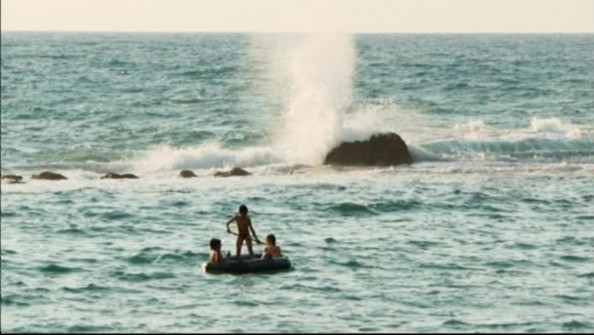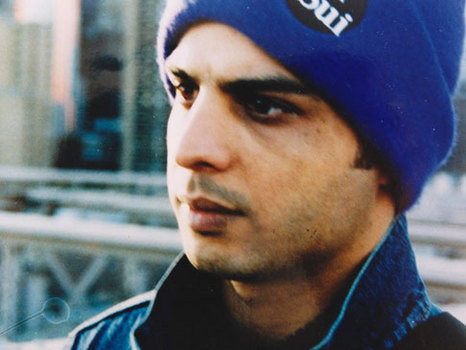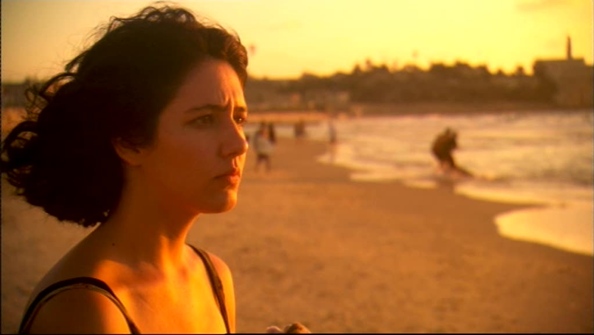
Ten years ago, on September 8, 2001, a young man drowned in the Mediterranean, just off Manta Ray beach in Tel Aviv. Bonfire Night (1998), his graduation film for the Sam Spiegel Film & Television School Jerusalem, tied with fellow classmate Nir Bergman’s Seahorses for first prize; an earlier student film, Imma Mitchatenet Im Avram (1997) accrued praise as well. He had directed the pilot for the television program Meurav Yerushalmi, and had made a witty commercial for Galatz, the IDF radio station, featuring a rocking yeshiva bucher. He had yet to make his first feature film. His name was Sharon Amrani.
Amrani’s films had already awakened the interest of film critic Yair Raveh, who admired the “uncompromising honesty” of Bonfire Night (1998), and saw it as a harbinger of a more emotional, personal style of narrative in Israeli film. Raveh wrote an article commemorating Amrani’s life and work that was scheduled to headline Ha’ir (The City) magazine. The next day was September 11, 2001. The article receded to the back pages of the magazine, but Raveh did not forget Amrani, and in his observation of the Israeli film scene and the resurgence it has experienced in the past ten years, he reflected on the ways in which this scene was forever altered by Amrani’s absence. These musings in turn became a documentary film.

Raveh’s film, Sharon Amrani – Remember His Name (2010), reveals the young charismatic filmmaker, his work and the close connection between the two through clips from Amrani’s films, interviews with family, friends, colleagues and teachers, photographs and home movies from Amrani’s childhood. The sense of loss is enormous. As his contemporary Dover Kosashvili says in the film: “Many people die and you can’t really know how big out loss is, and with Sharon you know. It’s like I were to die before making Late Marriage (2001).”
Yet Raveh does not only document the past, he documents a future that never will be: the films that Amrani did not live to create. Researching Amrani’s documents, Raveh found several short screenplays, and sought out three directors of Amrani’s generation to bring them to life on the screen. The short films are interwoven within the documentary: The Boat, directed by Nir Bergman, Albert and Ronit, directed by Dover Kosashvili, and Sabbath Eve, directed by Joseph Cedar. The warmth, intensity and drama of family life, issues of Persian ethnicity, tradition and the desire to break away from tradition, the competition and camaraderie of boys and men, the search for love, a persistent spiritual search and love of the sea; all these are reflected in the brief yet intriguing vignettes, imbuing the film with a sense of Amrani’s vision as a filmmaker and how his presence might have influenced the Israeli film scene.
Renen Schorr, Head of Sam Spiegel, speaks of Amrani’s charisma; Kosashvili, recalling their first meeting at a student film festival, calls him “a tiny Persian prince who can run the entire show”; a fellow classmate from the Yeshiva where Amrani studied for a year before beginning film school speaks of his “raging sobriety” and fellow Sam Spiegel classmate Binyamin Hiram recalls Amrani’s devotion to every detail in the making of his films, checking out every single alley in Hatikva neighborhood before deciding on the locations for his student film Imma Mitchatenet Im Avram.

The film has an unswerving honesty that examines Amrani’s life in all its contradictory aspects, colors and contrasts. The complex relationship between life and art is at the core of this film, acutely expressed in the scene directed by Gili Gaon. When Raveh asked Gaon, who was married to Amrani and with him on the day of his death, to tell him about the experience, she chose to tell the story of that day in film. As with the other dramatic sequences, the film within a film is shown in its entirety, but interspersed at other junctures within the documentary are scenes of the dramatic sequence as it is being filmed: the boom microphone poised over the crowd on the beach, cameras, someone holding up a large white board to reflect the light. The golden sunlight, the wide sea and sound of the waves, the actors, crew, and equipment of a movie set; the beauty of nature, the beauty of artifice: the attempt to understand a life, acknowledging its mystery.
Sharon Amrani: Remember His Name premiered at the 2010 Haifa International Film Festival. Commemorating the ten year anniversary of Amrani’s untimely death, the film will be shown on the Yes Docu channel on Saturday, September 10, 2011 at 21:00.
Ehud Banai composed the music for Raveh’s film, as he did for Amrani’s Bonfire Night. Banai had written the song Ad HaPa’am Haba’a (Until Next Time), but had not recorded it. Raveh felt that the song expressed the intentions of the documentary so fully, that he persuaded Banai to record the song, which is in the film and on Banai’s album Resisei Layla (Fragments of Night). Netta Brown, a recent Sam Spiegel graduate, edited this clip with a shorter version of the song, as a tribute to Sharon Amrani. Enjoy!






I don’t follow Israeli film, and this was an eyeopener. The involvement of the late Sharon Amrani’s colleagues in acknowledging his gifts accentuates his loss, as it seems they intended. A moving tribute that speaks well of this community’s compassion, a model for us all. Thank you.
Comments are closed.